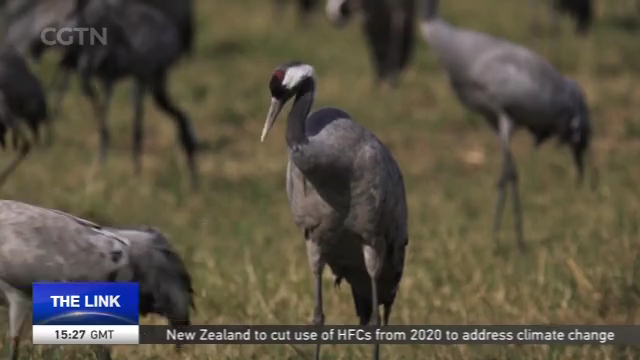
11:20, 14-Dec-2018
Bird Migration: Habitat loss changes bird migration patterns and has impacts on humans
Updated
11:19, 17-Dec-2018
03:33

Some experts say to understand how a changing environment impacts us all, all you need to do is to look at birds. Their changing migration patterns - and loss of habitat - could serve as a grim warning. CGTN's Stephanie Freid has this story.
ALEN KACAL, DIRECTOR JERUSALEM BIRD OBSERVATORY "That's the million dollar question. What is it going to mean for the world when we say we're in a period of our history with massive extinction happening? Every species we lose puts us closer to that species that's gonna collapse the ecosystem."
In the 25 years, Jerusalem Ornithologists have been catching and ringing migrating birds, they've seen entire species disappear.
"What is it?"
"It's a black cap."
"Nice."
Black-capped warblers from Finland and Siberia used to migrate through Israel by the tens of millions. Not anymore.
Quails and European turtle doves - around since Biblical times - will soon be extinct, due to hunting and habitat loss.
Changed migratory patterns and extinction are global phenomenon that need addressing on a global level.
Tagging birds is a collaborative effort on the part of scientists worldwide who are building migratory maps in order to conserve bird habitats.
ALEN KACAL, DIRECTOR JERUSALEM BIRD OBSERVATORY "Someone in Europe will catch the bird, they'll read the ring and they'll contact us and they'll say we caught ring No. X259 in Germany on this date. Can you tell us when you caught it?"
In northern Israel, Cranes that used to stop over on the way from Russia to Ethiopia aren't crossing the desert anymore.
STEPHANIE FREID HULA VALLEY, ISRAEL "Increasingly, cranes are sticking in Israel for the winter. Fifty years ago, maybe a thousand would stay for the cold season. Today that number is closer to sixty thousand."
SHAI AGMON, DIRECTOR HULA VALLEY AVIAN RESEARCH CENTER "The desert is growing and the desert is growing fast. Birds will not cross the desert if it's just too wide. There's just no way for them. Trying to cross the desert means dying. Like driving on the same road and suddenly someone moved your gas station 400 kilometers away."
Israel's farmers supply the Cranes with eight tons of feed every day - not to render them dependent but to keep them from destroying viable crops.
It's costly and ornithologists suggest the burden be shared globally.
SHAI AGMON, DIRECTOR HULA VALLEY AVIAN RESEARCH CENTER "By feeding the cranes here, we keep the cranes for Sweden and the Baltic States and Ukraine, Russia, Poland, Germany. We keep the cranes for those guys. Maybe they should help as well."
The idiom "canary in a coalmine" comes from the historic practice of miners taking a canary into a shaft to detect noxious gases. If the canary died, miners knew it wasn't safe to go down.
ALEN KACAL, DIRECTOR JERUSALEM BIRD OBSERVATORY "We need to take care of our environment not just because of the aesthetics - not just because they're beautiful and they sound good but because this is our life. They're providing us with the services whether it's oxygen or water. Without it, we're not going to survive."
Migration changes and bird population decline are modern day "canaries in the coal mine". The here and now warnings that something is very wrong.
STEPHANIE FREID, CGTN, THE HULA VALLEY, ISRAEL.

SITEMAP
Copyright © 2018 CGTN. Beijing ICP prepared NO.16065310-3
Copyright © 2018 CGTN. Beijing ICP prepared NO.16065310-3